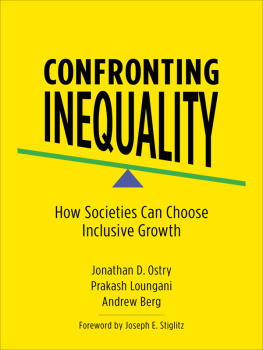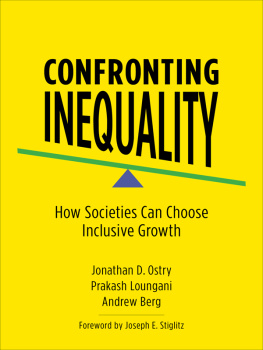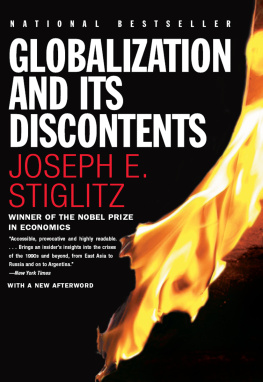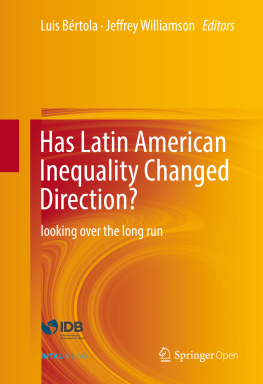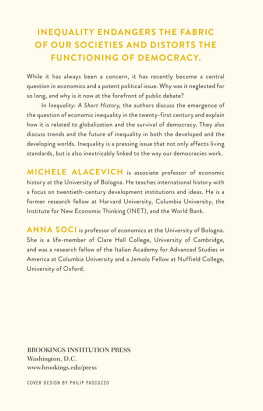Table of Contents
CONFRONTING INEQUALITY
CONFRONTING INEQUALITY
HOW SOCIETIES CAN CHOOSE INCLUSIVE GROWTH
Jonathan D. Ostry,
Prakash Loungani,
and Andrew Berg
Foreword by Joseph E. Stiglitz
COLUMBIA UNIVERSITY PRESS / NEW YORK
Columbia University Press gratefully acknowledges the generous contribution for this book provided by Publishers Circle member Michael R. Yogg.
The views expressed in this book are those of the authors and do not necessarily represent the views of the IMF, its Executive Board, or IMF management.
Columbia University Press
Publishers Since 1893
New York Chichester, West Sussex
cup.columbia.edu
Copyright 2019 Columbia University Press
All rights reserved
E-ISBN 978-0-231-52761-3
Library of Congress Cataloging-in-Publication Data
Names: Ostry, Jonathan David, 1962 author. | Loungani, Prakash, author. | Berg, Andrew, author.
Title: Confronting inequality: how societies can choose inclusive growth / Jonathan D. Ostry, Prakash Loungani, and Andrew Berg.
Description: New York: Columbia University Press, [2019] | Includes bibliographical references and index.
Identifiers: LCCN 2018035788 | ISBN 9780231174688 (hardback) | ISBN 9780231174695 (pbk.) | ISBN 9780231527613 (e-book)
Subjects: LCSH: Income distribution. | EqualityEconomic aspects. | Economic development.
Classification: LCC HC79.I5 O85 2019 | DDC 339.2dc23
LC record available at https://lccn.loc.gov/2018035788
A Columbia University Press E-book.
CUP would be pleased to hear about your reading experience with this e-book at .
Cover design: Lisa Hamm
To our wives: Rachel, Gail, and Katie
And our children:
Daniel and Joshua, David and Jonathan, and Sarah and Noah, in the hope that their world will be more inclusive than ours
CONTENTS
by Joseph E. Stiglitz
T extbooks in economics often sketch a world in which some people earn more than others because they contribute more to society. In this world, income inequality is thus a just outcome, the result of each getting a reward commensurate to productivity, and redistribution of incomes from the rich to the poor would hurt economic efficiency by taking away incentives for people to work hard. In this fairy-tale world, everyone gets richer over time through increases in productivity.
The reality is otherwise, and in recent years, has been grim. Historically, wages and median incomes have increased in tandem with productivity, but for the past three decades among many rich societies, productivity has increased while median incomes have been stagnant. Labors share of income has fallen, not just in rich countries, but in many others as well. This suggests that giving capital greater freedom to move within and across countries, while labor remains much less mobile, has led to a weakening of the bargaining power of workers and labor unions. When capital is highly mobile, companies can threaten to move elsewhere if workers dont accept lower wages. If this is so, then wages no longer correspond to workers marginal contribution to society.
This book shows that, far from being either necessary or good for growth, inequality leads to weaker economic performance. And redistribution of incomes, unless very extreme, does not harm growth. We used to think that there was a trade-off: we could achieve more equality, but only at the expense of overall economic performance. It is now clear that, given the findings of this book and others, greater equality and improved growth go together.
The authors also show that the increase in inequality has been a choice, not an unexpected outcome. The extent of inequality depends very much on the policies governments chosewhether to have unfettered mobility of capital, how much austerity to impose, how much to deregulate markets. These policies may confer growth benefits in some cases but many are shown to have increased inequality over the past three decades.
These conclusions come from careful research conducted by the authors over several years and published in leading academic journals. They represent a welcome commitment at multilateral institutions to evidence-based policy advice. Two decades ago, the IMF was a forceful advocate for allowing free flows of capital across countries. The evidence on the elusive growth benefits of free capital mobilityand on the adverse consequences for both growth and equity when mismanaged opening to capital flows leads to financial crisishas led to a more nuanced institutional view. And the OECD, which once upon a time advocated a no-holds-barred approach of Going for Growth has come around now to thinking that we are all In It Together: Why Less Inequality Benefits All, the title of its 2015 report.
The policies needed to lower inequality are not difficult to identify. First, we need to keep extreme inequalities of income from emerging in the first place. For this, we need more investment in public goods, particularly health and education, which is a key determinant of workers income. If governments ensure equal access to health and education, the distribution of incomes will indeed reflect to a much greater extent the distribution of abilities, as the textbooks promise.
Second, we need macroeconomic and structural policies that maintain aggregate demand and deliver full employment. This means monetary and fiscal policies that do not make a fetish of inflation and fiscal targets at the expense of employment and wage growth. It also requires checks on deregulation and capital mobility to tilt the playing field back toward labor. These policies, together with a range of forceful structural policies contributing to the increased bargaining power of workers, improved corporate governance, and taming market power, will go a long way toward redressing the increases in inequality from policy choices over the past three decades. But they may not be enough. So, third, we need to be open to policies to redistribute incomes, as IMF managing director Christine Lagarde noted forcefully at Davos in 2017.
Through these new rules of the road to govern the market economy, it is possible to maintain aggregate demand and thereby alleviate inequality and boost growth. This books bottom-line message is simple: societies are free to choose policies that will deliver this more inclusive growth.
Joseph E. Stiglitz
I n December 2010, Tunisia erupted in popular protests that brought a swift end to its political regime. This came as a surprise to many, including at the IMF, given the countrys sound macroeconomic indicators and the progress it had made in its reform agenda. The events in Tunisia fueled the Arab Spring, a demand across the region for greater economic equity. In September 2011, the protest against inequality jumped shores with the launch of the Occupy Wall Street movementtheir slogan was We are the 99 percent.

